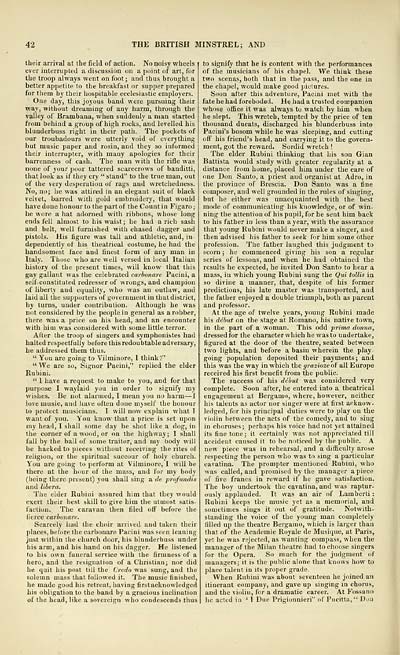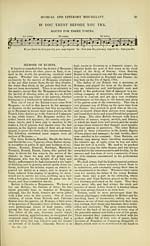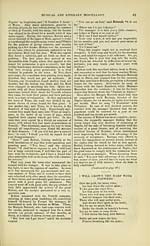Glen Collection of printed music > Printed music > British minstrel, and musical and literary miscellany
(734) Page 42
Download files
Complete book:
Individual page:
Thumbnail gallery: Grid view | List view

42
THE BRITISH MINSTREL; AND
their arrival at the field of action. No noisy wheels
ever interrupted a discussion on a point of art, for
the troop always went on foot; and thus brought a
better appetite to the breakfast or supper prepared
for them by their hospitable ecclesiastic employers.
One day, this joyous band were pursuing their
way, without dreaming of any harm, through the
valley of Brambana, when suddenly a man started
from behind a group of high rocks, and levelled his
blunderbuss right in their path. The pockets of
our troubadours were utterly void of everything
but music paper and rosin, and they so informed
their interrupter, with many apologies for their
barrenness of cash. The man with the rifle was
none of your poor tattered scarecrows of banditti,
that look as if they cry " stand" to the true man, out
of the very desperation of rags and wretchedness.
No, no; he was attired in an elegant suit of black
velvet, barred with gold embroidery, that would
have done honour to the part of the Count in Figaro ;
he wore a hat adorned with ribbons, whose long
ends fell almost to his waist; he had a rich sash
and belt, well furnished with chased dagger and
pistols. His figure was tall and athletic, and, in-
dependently of his theatrical costume, he liad the
handsomest face and finest form of any man in
Italy. Those who are well versed in local Italian
history of the present times, will know that this
gay gallant was the celebrated carbonare Pacini, a
self-constituted redresser of wrongs, and champion
of liberty and equality, who was an outlaw, and
laid all the supporters of government in that district,
by turns, under contribution. Although he was
not considered by the people in general as a robber,
there was a price on his head, and an encounter
with him was considered with some little terror.
After the troop of singers and symphonistes had
halted respectfully before this redoubtable adversary,
he addressed them thus.
" You are going to Vilminore, 1 think?''
" We are so, Signor Pacini," replied the elder
Rubini.
" 1 have a request to make to you, and for that
purpose I waylaid you in order to signify my
wishes. Be not alarmed, I mean you no harm — I
love music, and liave often done myself the honour
to protect musicians. I will now explain what J
want of you. You know that a price is set upon
my head, I shall some day be shot like a dog, in
the corner of a wood, or on the highway; I shall
fall by the ball of some traitor, and my body will
be hacked to pieces without receiving the rites of
religion, or the spiritual succour of holy church.
You are going to perform at Vilminore, I will be
there at tlie hour of the mass, and for my body
(being there present) you shall sing a de profundis
and libera.
The elder Rubini assured him that they would
exert their best skill to give him the utmost satis-
faction. The caravan then filed off before the
fierce carbonare.
Scarcely had the choir arrived and taken their
places, before the carbonare Pacini was seen leaning
just within the church door, his blunderbuss under
his arm, and his hand on his dagger. He listened
to his own funeral service with the firmness of a
hero, and the resignation of a Christian; nor did
he quit his post till the Credo was sung, and the
solemn mass that followed it. The music finished,
he made good his retreat, having firstacknowledged
his obligation to the hand by a gracious inclination
of the head, like a sovereign who condescends thus
to signify that he is content with the performances
of the musicians of his chapel. We think these
two scenas, both that in the pass, and the one in
the chapel, would make good pictures.
Soon after this adventure, Pacini met with the
fate he had foreboded. He had a trusted companion
whose office it was always to watch by him when
he slept. This wretch, tempted by the price of ten
thousand ducats, discharged his blunderbuss into
Pacini's bosom while he was sleeping, and cutting
off his friend's head, and carrying it to the govern-
ment, got the reward. Sordid wretch !
The elder Rubini thinking that his son Gian
Battista would study with greater regularity at a
distance from home, placed him under the care of
one Don Santo, a priest and organist at Adro, in
the province of Brescia. Don Santo was a fine
composer, and well grounded in the rules of singing,
but he either was unacquainted with the best
mode of communicating his knowledge, or of win-
ning the attention of his pupil, for he sent him back
to his father in less than a year, with the assurance
that young Rubini would never make a singer, and
then advised his father to seek for him some other
profession. The father laughed this judgment to
scorn ; he commenced giving his son a regular
series of lessons, and when he had obtained the
results he expected, he invited Don Santo to hear a
mass, in which young Rubini sung the Qtd tollis in
so divine a manner, that, despite of his former
predictions, his late master was transported, and
the father enjoyed a double triumph, both as parent
and professor.
At the age of twelve years, young Rubini made
his debut on the stage at Romano, his native town,
in the part of a woman. This odd prima donna,
dressed for the character which he was to undertake,
figured at the door of the theatre, seated between
two lights, and before a basin wherein the play-
going population deposited their payments ; and
this was the way in which the ^razio^eof all Europe
received his first benefit from the public.
The success of his debut was considered very
complete. Soon after, he entered into a theatrical
engagement at Bergamo, where, however, neither
his talents as actor nor singer were at first acknow-
ledged, for his principal duties were to play on the
violin between the acts of the comedy, and to sing
in choruses; perhaps his voice had not yet attained
its fine tone ; it certainly was not appreciated till
accident caused it to be noticed by the public. A
new piece was in rehearsal, and a difficulty arose
respecting the person who was to sing a particular
cavatina. The prompter mentioned Rubini, who
was called, and promised by the manager a piece
of five francs in reward if he gave satisfaction.
The boy undertook the cavatina, and was raptur-
ously applauded. It was an air of Lamberti :
Rubini keeps the music yet as a memorial, and
sometimes sings it out of gratitude. Notwith-
standing the voice of the young man completely
tilled up the theatre Bergamo, which is larger than
that of the Academic Royale de Musique, at Paris,
yet he was rejected, as wanting compass, when the
manager of the Milan theatre had to choose singers
for the Opera. So much for the judgment of
managers; it is the public alone that knows how to
place talent in its proper grade.
When Rubini was about seventeen he joined an
itinerant company, and gave up singing in chorus,
and the violin, for a dramatic career. At Fossano
he acted in ' I Due Prigionnieri" of Pucitta, " Don
THE BRITISH MINSTREL; AND
their arrival at the field of action. No noisy wheels
ever interrupted a discussion on a point of art, for
the troop always went on foot; and thus brought a
better appetite to the breakfast or supper prepared
for them by their hospitable ecclesiastic employers.
One day, this joyous band were pursuing their
way, without dreaming of any harm, through the
valley of Brambana, when suddenly a man started
from behind a group of high rocks, and levelled his
blunderbuss right in their path. The pockets of
our troubadours were utterly void of everything
but music paper and rosin, and they so informed
their interrupter, with many apologies for their
barrenness of cash. The man with the rifle was
none of your poor tattered scarecrows of banditti,
that look as if they cry " stand" to the true man, out
of the very desperation of rags and wretchedness.
No, no; he was attired in an elegant suit of black
velvet, barred with gold embroidery, that would
have done honour to the part of the Count in Figaro ;
he wore a hat adorned with ribbons, whose long
ends fell almost to his waist; he had a rich sash
and belt, well furnished with chased dagger and
pistols. His figure was tall and athletic, and, in-
dependently of his theatrical costume, he liad the
handsomest face and finest form of any man in
Italy. Those who are well versed in local Italian
history of the present times, will know that this
gay gallant was the celebrated carbonare Pacini, a
self-constituted redresser of wrongs, and champion
of liberty and equality, who was an outlaw, and
laid all the supporters of government in that district,
by turns, under contribution. Although he was
not considered by the people in general as a robber,
there was a price on his head, and an encounter
with him was considered with some little terror.
After the troop of singers and symphonistes had
halted respectfully before this redoubtable adversary,
he addressed them thus.
" You are going to Vilminore, 1 think?''
" We are so, Signor Pacini," replied the elder
Rubini.
" 1 have a request to make to you, and for that
purpose I waylaid you in order to signify my
wishes. Be not alarmed, I mean you no harm — I
love music, and liave often done myself the honour
to protect musicians. I will now explain what J
want of you. You know that a price is set upon
my head, I shall some day be shot like a dog, in
the corner of a wood, or on the highway; I shall
fall by the ball of some traitor, and my body will
be hacked to pieces without receiving the rites of
religion, or the spiritual succour of holy church.
You are going to perform at Vilminore, I will be
there at tlie hour of the mass, and for my body
(being there present) you shall sing a de profundis
and libera.
The elder Rubini assured him that they would
exert their best skill to give him the utmost satis-
faction. The caravan then filed off before the
fierce carbonare.
Scarcely had the choir arrived and taken their
places, before the carbonare Pacini was seen leaning
just within the church door, his blunderbuss under
his arm, and his hand on his dagger. He listened
to his own funeral service with the firmness of a
hero, and the resignation of a Christian; nor did
he quit his post till the Credo was sung, and the
solemn mass that followed it. The music finished,
he made good his retreat, having firstacknowledged
his obligation to the hand by a gracious inclination
of the head, like a sovereign who condescends thus
to signify that he is content with the performances
of the musicians of his chapel. We think these
two scenas, both that in the pass, and the one in
the chapel, would make good pictures.
Soon after this adventure, Pacini met with the
fate he had foreboded. He had a trusted companion
whose office it was always to watch by him when
he slept. This wretch, tempted by the price of ten
thousand ducats, discharged his blunderbuss into
Pacini's bosom while he was sleeping, and cutting
off his friend's head, and carrying it to the govern-
ment, got the reward. Sordid wretch !
The elder Rubini thinking that his son Gian
Battista would study with greater regularity at a
distance from home, placed him under the care of
one Don Santo, a priest and organist at Adro, in
the province of Brescia. Don Santo was a fine
composer, and well grounded in the rules of singing,
but he either was unacquainted with the best
mode of communicating his knowledge, or of win-
ning the attention of his pupil, for he sent him back
to his father in less than a year, with the assurance
that young Rubini would never make a singer, and
then advised his father to seek for him some other
profession. The father laughed this judgment to
scorn ; he commenced giving his son a regular
series of lessons, and when he had obtained the
results he expected, he invited Don Santo to hear a
mass, in which young Rubini sung the Qtd tollis in
so divine a manner, that, despite of his former
predictions, his late master was transported, and
the father enjoyed a double triumph, both as parent
and professor.
At the age of twelve years, young Rubini made
his debut on the stage at Romano, his native town,
in the part of a woman. This odd prima donna,
dressed for the character which he was to undertake,
figured at the door of the theatre, seated between
two lights, and before a basin wherein the play-
going population deposited their payments ; and
this was the way in which the ^razio^eof all Europe
received his first benefit from the public.
The success of his debut was considered very
complete. Soon after, he entered into a theatrical
engagement at Bergamo, where, however, neither
his talents as actor nor singer were at first acknow-
ledged, for his principal duties were to play on the
violin between the acts of the comedy, and to sing
in choruses; perhaps his voice had not yet attained
its fine tone ; it certainly was not appreciated till
accident caused it to be noticed by the public. A
new piece was in rehearsal, and a difficulty arose
respecting the person who was to sing a particular
cavatina. The prompter mentioned Rubini, who
was called, and promised by the manager a piece
of five francs in reward if he gave satisfaction.
The boy undertook the cavatina, and was raptur-
ously applauded. It was an air of Lamberti :
Rubini keeps the music yet as a memorial, and
sometimes sings it out of gratitude. Notwith-
standing the voice of the young man completely
tilled up the theatre Bergamo, which is larger than
that of the Academic Royale de Musique, at Paris,
yet he was rejected, as wanting compass, when the
manager of the Milan theatre had to choose singers
for the Opera. So much for the judgment of
managers; it is the public alone that knows how to
place talent in its proper grade.
When Rubini was about seventeen he joined an
itinerant company, and gave up singing in chorus,
and the violin, for a dramatic career. At Fossano
he acted in ' I Due Prigionnieri" of Pucitta, " Don
Set display mode to: Large image | Transcription
Images and transcriptions on this page, including medium image downloads, may be used under the Creative Commons Attribution 4.0 International Licence unless otherwise stated. ![]()
| Special collections of printed music > Glen Collection of printed music > Printed music > British minstrel, and musical and literary miscellany > (734) Page 42 |
|---|
| Permanent URL | https://digital.nls.uk/91443753 |
|---|
| Description | Scottish songs and music of the 18th and early 19th centuries, including music for the Highland bagpipe. These are selected items from the collection of John Glen (1833 to 1904). Also includes a few manuscripts, some treatises, and other books on the subject. |
|---|
| Description | The Glen Collection and the Inglis Collection represent mainly 18th and 19th century Scottish music, including Scottish songs. The collections of Berlioz and Verdi collected by bibliographer Cecil Hopkinson contain contemporary and later editions of the works of the two composers Berlioz and Verdi. |
|---|

